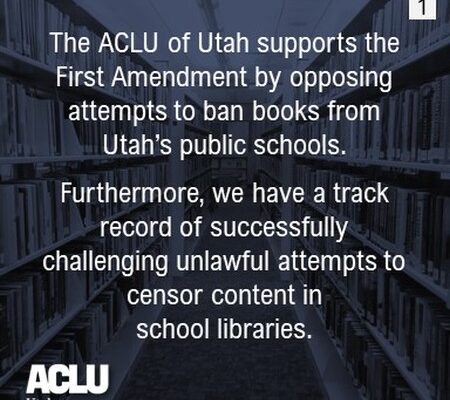Deseret News
By Jason Groth
April 2, 2022
While banning books from school libraries may seem like something people did in the past, it is happening today in Utah.
Earlier this year, the ACLU of Utah intervened to stop the removal of two award-winning books from libraries in the Washington County School District. Last year, we investigated similar removals in Canyons School District.
These examples of book censorship are not limited to Utah but join a larger coordinated attack across the nation on students’ First Amendment right to access content free from viewpoint discrimination.
People who seek to ban books use the excuse that the material they target is “inappropriate” due to violent or sexual content. But the real reasons these books are being targeted is obvious to anyone who scans their titles and covers: The common denominator of banned books is their focus on race and LGBTQ+ issues.
Although students’ rights under the First Amendment are subject to some restrictions at school, prohibiting or limiting students’ access to library books because some parents or administrators disagree with their viewpoints is never allowed. Accordingly, adults’ discomfort with or dislike of honest and accurate discussions of racism, anti-Blackness, sexism and other issues is not a valid justification to remove or limit access to a book.
This rule is especially important because public school libraries are places where diverse perspectives foster a resilient and educated democracy that can better navigate the realities of a pluralistic society.
In January, the ACLU of Utah received complaints from parents and community members from Washington County about the removal of two books from school libraries, “The Hate U Give” and “Out of Darkness.” Like other recent attempts to ban books, the subject matter of these texts focused on racial justice issues.
We investigated the incidents and determined the books were withdrawn in violation of the First Amendment. Their removal was guided by biased, arbitrary procedures and because individuals and groups disagreed with ideas in the books. Such actions by school districts can violate the Constitution.
As a result, we sent the school district a letter demanding their reinstatement, and the school district complied and returned the books to library shelves.
This episode was not the first time we’ve taken on a book ban and won. In 2012, we sued Davis County School District when it required written parental permission for children to read “In Our Mothers’ House,” a book about a family with two mothers. Restricting access to certain books sends a problematic message to children, suggesting that something is wrong with the viewpoints expressed in these books, and in this case, a family with two parents of the same gender.
To settle the case, the district allowed the book to be available to all students without restrictions.
While the successful return of banned books to library shelves in Washington and Davis counties represent civil liberties victories, we remain vigilant to ensure the constitutional rights of all students in all Utah schools are protected. We are currently investigating another attempt to ban books in Canyons School District where nine books were initially removed before six were reportedly returned to the shelves. We also testified on these issuesduring the 2022 legislative session, underscoring the reality that removing books from schools because they contain “sensitive materials” may be used a pretext to silence Black, brown and LGBTQ+ authors and their communities.
We anticipate that attempts to stifle diverse viewpoints will continue in school districts across Utah. We will not relent in protecting the First Amendment and student rights, especially where Black, Indigenous, people of color and LGBTQ+ communities are continuously targeted and harmed by these efforts.
Their perspectives and lived experiences cannot and should not be erased from our libraries.
If you are concerned about book banning in your community, you may contact your local elected officials, your local school board and the Utah State Board of Education. It is important that elected officials and school administrators hear your opinion about why unconstitutional book bans are bad for your community. You may also submit a complaint with the ACLU of Utah so we can review and address these issues. Together, we can protect the First Amendment for Utah students and future generations.
Jason M. Groth is the deputy legal director at the ACLU of Utah.
Related Issues
Related Content

- First Amendment
ACLU of Utah Statement on Book Banning and the First Amendment
Stay Informed
Sign up to be the first to hear about how to take action.
By completing this form, I agree to receive occasional emails per the terms of the ACLU’s privacy statement.
By completing this form, I agree to receive occasional emails per the terms of the ACLU’s privacy statement.
